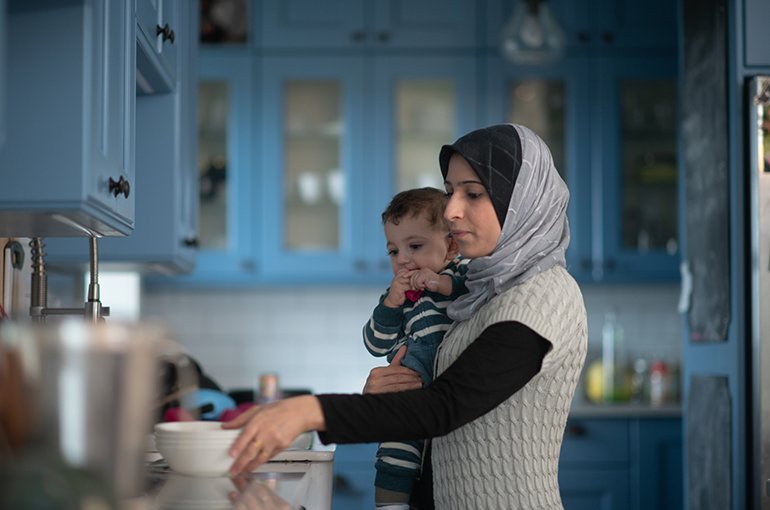Designated Caregivers: Migrant Mothers During a Global Pandemic
Contribution by: Nereida Ordovás

Contribution by: Nereida Ordovás for the Gender, Diversity and COVID-19 platform. The platform offers a series of short blogposts in which we invite different Hub members and researchers to share their findings, insights and reading tips on issues of inclusion and exclusion related to the Corona crisis.
Nothing could have prepared me for the realization that I was a mother, one of those givens, when I knew I was still in a state of uncreation myself.
Adrienne Rich. Of woman born.
Migrant mothers have bore the largest responsibility of childcare and housekeeping tasks within their families since the start of the lockdown in mid-March. As a psychologist specialized in the migration experience, I am interested in how their mental health is affected by this burden, particularly when they continue working as employees or freelancers. While fathers have contributed to the care comparatively more than they previously used to during this exceptional situation, the weight was still clearly on mothers. It translated into more feelings of anxiety, sadness and uncertainty; the cheapest price to pay was their own free time. The ¨intelligent lockdown¨ measures implemented in The Netherlands supposed a great challenge for Dutch mothers and fathers too, as it wasn´t possible for them neither to count with the help of oma´s and opa´s.
Working and caring
For years now, part-time work has become the norm for a large number of Dutch women in The Netherlands. Many migrant women decide to work part-time too, adjusting to what seems to be the norm. In many cases working in a part-time position put them in a more vulnerable place because their remunerated job is seen as ¨supplementary¨, meaning that women do it just as pocket money. As a result, during the lockdown migrant mothers with a part-time job felt as the ¨designated caregivers¨ for children and housekeeping while husbands devoted themselves to earn the real money, the one that pays the household expenses.
The lack of a support network
In addition, the lack of a support network adds a weight. A migrant mother from Peru shared with me how scared she was just thinking at the possibility of becoming ill. She thought: who is going to take care of my children then? This was and still is a common worry. Without a support network such as close relatives and friends, the high sense of responsibility that migrant mothers feel can be overwhelming. As a matter of fact, immigrant mothers experiencing isolation have a greater risk of experiencing psychological problems. New mothers, women who gave birth during the lockdown, have experienced an isolation that has been imposed on them as the impossibility for their families (especially the mother´s mother) to travel to The Netherlands to help with the newborn.
For migrant mothers it is essential to have the possibility to express themselves, to share their points of view and struggles and to meet other women in similar situations. Last year, I had the opportunity to facilitate a support workshop for Spanish-speaking migrant mothers in The Netherlands. During the session, they could to speak out loud about their everyday struggles as a mother in a foreign land. For them it was a liberating experience and a rewarding experience for me.
Maternal geographies
Some migrant mothers were relieved about the fact that, in The Netherlands, people could go out to the street with their children (in contrast to their countries of origin, such as the case of Spain). As a mother, one creates her own maternal geographies, the paths and routes that a mother walks (or bikes) with her child and that allow her to go out of her domestic role. During the lockdown, mothers spent more time with their children than ever before and one is not able to give love all the time without interruption, although as Adrienne Rich wrote, we have been educated to love like that. The frustration that comes from the realization that we simply are not able to do that only adds to the feeling of guilt. Being able to get out of the house, however with the children, gives mothers a break from their caring role represented by the house.
The need to share the unspoken
This Covid-19 pandemic has given place to new inequalities and has put a magnifying glass on the ones already happening. As a psychologist and as a migrant mother I think that the government, the scientific community, stakeholders, and society at large need to give visibility to the challenges of motherhood that have been made so clear during the lockdown, with a special look to migrant motherhood, therefore attending the need of an intersectional analysis. These challenges continue affecting us in our sailing through various identity transitions as mothers, as migrants and as human beings during a global pandemic.

